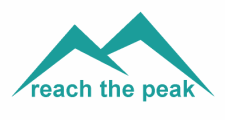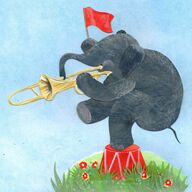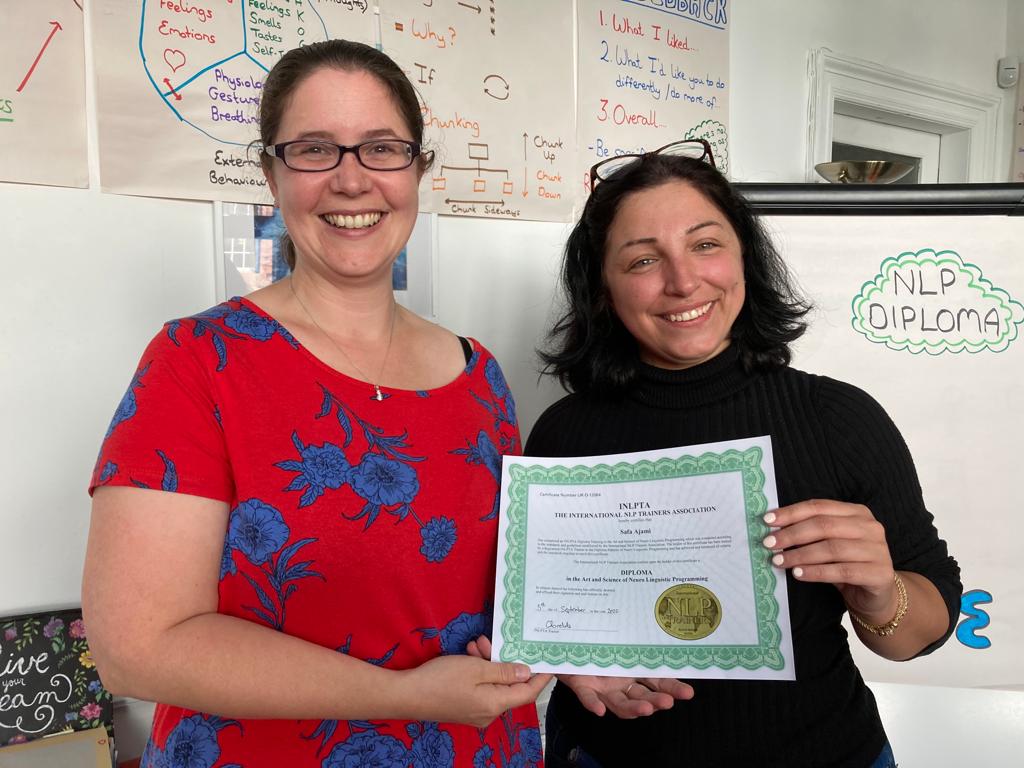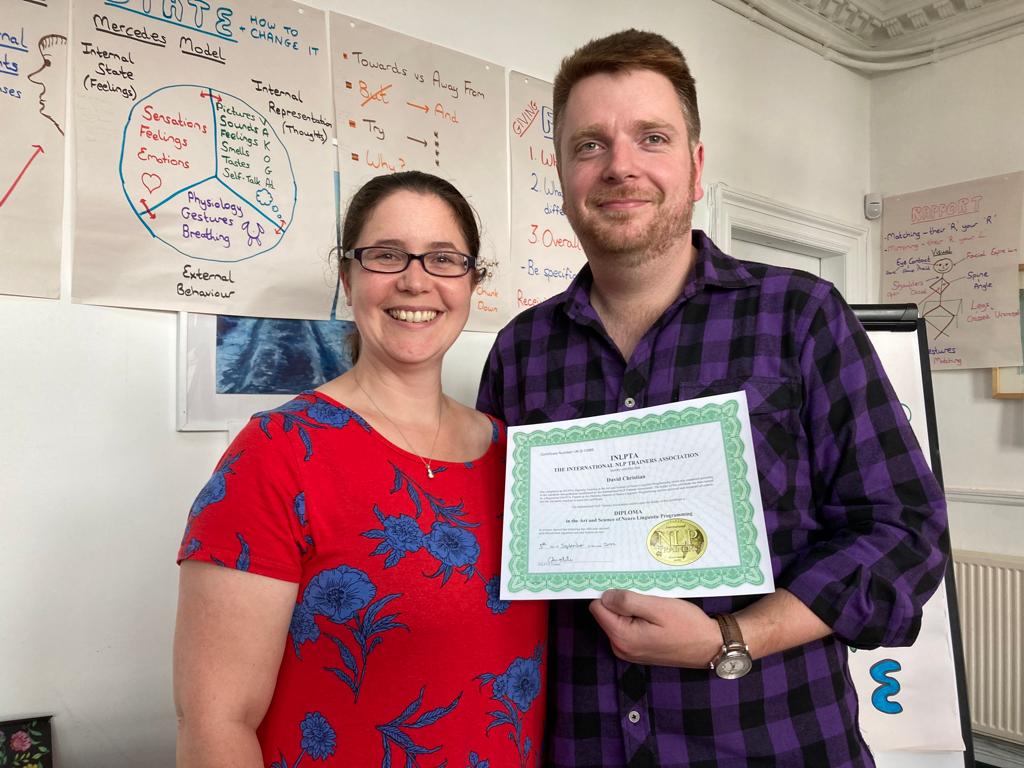Below, I’ll explain about the different courses you can do if you want study NLP in person, including NLP Diploma, NLP Practitioner, or NLP Master Practitioner.
Or simply if you know you’re interested in other people, and/or in self-development, but you’re not sure if NLP is what you’re looking for, I’ll explain some of what the course covers.
So, what is an NLP Diploma? Let me explain.
The NLP Diploma is the first level of certification when you train in NLP. It is essentially a personal development course where you learn some fascinating things about yourself! It’s all about communication: both communication between 2 or more people, and also, and perhaps more importantly, the communication we have with ourselves – that little voice that sits on your shoulder and gives you a continuous commentary on what you’re doing, telling you that you’ve done really well, or, unfortunately more often, that you’ve done or said something stupid. Or perhaps it's simply wondering what you’re having for dinner tonight or going over the shopping list.
(In fact, that little voice is probably commenting right now, saying something like “Oh yes, I do have one of those voices!”)
Because calling it ‘NLP Diploma’ doesn’t always give much clue as to what the course is, I’ve recently started called my NLP Diploma course ‘Change Your Life with NLP,’ as that is what lots of my participants tell me it’s done for them once they’ve attending the course.
Delegates join the course for many different reasons, both personal and professional. They broadly fall into one or more the following categories:
- they are interested in their own personal development, self-awareness and people in general;
- they are wanting to do the course for professional reasons - to improve leadership skills, management, understand their team, or looking to influence others at work;
- they have a big life change of some sort, either brewing, or already underway - job change, relationship change, health change, retirement, or working towards a large goal
- they want to coach others.
The range of topics covers quite a bit. Here are just some examples:
We cover things like how your eye movements can help us to remember information, or access how we’re feeling. Why do your eyes stare up at the ceiling when you’re trying to remember something? (Hint: It’s not normally because the answer is written there!) Or how they might you eye movements help you to picture an elephant playing the trombone. 😊 (Should you ever want to do such a thing!)
We explore how sitting cross legged can make someone else feel uncomfortable and how slouching in your chair could help you feel connected to someone. And how you might be able to encourage someone on the far side of the room to turn and look at you, or how to compel a complete stranger to come and talk to you at a party or networking event.
We discover the power of your body language – how the simple act of standing up can make you feel more assertive. How taking a Wonderwoman, or Superman pose can make you feel more powerful. How arranging your face in a smile can actually make you start feeling a bit happier. And why certain pieces of music might make you want to clean your kitchen, or dance around the house, or indeed, make you feel blissfully relaxed and peaceful.
And how saying ‘but’ can instantaneously make the other person feel defensive, and effectively delete everything you’ve said before the ‘but.’ We explore how saying the word ‘when’ rather than ‘if’ can make you much more likely to achieve your goals. And how Yoda was an NLP Master as well as a Jedi Master when he says “Do or do not. There is no try.”
We’ll explore how you experience time – to what extend you’re living in the past, or dreaming (or worrying) about the future. Or whether you’re fully in the moment right now. (And that neither of these is right nor wrong, it's just a preference in how we process time.)
We’ll discover why, for some people, being just 3 minutes late for something can make them really anxious, or really irritated if its someone else who late. And how it’s possible for some people to completely lose track of time.
In summary, you’ll learn about how you do your thinking, how you process information, your preferences for storing memories, how you experience time. You’ll also discover how other people are different to you, in ways that you have perhaps never thought of, because “isn’t that the way everyone thinks?” (Hint: no, not everyone thinks like you!)
It can help answer questions like:
- Why does it feel like I never see eye-to-eye with that colleague at work? It’s like we’re speaking a different language.
- How does it feel like I’ve known this person for ages, even though I’ve just met them? We really click.
This includes things like:
- how we build rapport with others,
- how we can mend rapport after an argument
- how to manage our emotional state, to feel more confident, more calm, more resilient.
- how we can tell that someone has just had an emotional reaction to what we’ve said
- how our eye movements can leak information about what our thought processes might be
- how we can develop our mindset for more success and happiness, and a more positive outlook on life.
But isn’t that manipulation? This can be a common misconception about NLP. Sure, the skills you learn on an NLP course absolutely could be used for manipulative or devious purposes, IF you’re a manipulative or devious person.
NLP is just a tool – it's up to the ethics of the person to use that tool wisely. Just like a hammer is an excellent and perfectly acceptable tool for knocking in nails, it can also be used to bash people over the head.
There are many different schools and accrediting bodies of NLP – I am certified under the International NLP Trainer’s Association (INLPTA.) I chose them as their courses are highly regarded for their professionalism, high quality, thoroughness and focus on ethics. Part of the ongoing assessment for participants on the NLP Diploma course is their ethical approach to using NLP.
What are the options if I’ve completed an NLP Diploma and want to continue learning NLP?
The Practitioner course takes things to the next level, to much greater depth, and with a focus of regularly using NLP with yourself and other people, whether friends, family and colleagues, or paying clients. It can also be a powerful personal development journey as you work through a big life change, or towards an important goal.
If the NLP Diploma is a mostly focussed as a personal development course, the NLP Practitioner is further personal development and self-awareness, plus becoming an NLP Technician, with a large range of tools at your disposal to help yourself and help others to make real changes in their life.
If you’re still keen for more after the NLP Practitioner training, then the NLP Master Practitioner course is for you! This is a further 16 days and delves even deeper into how NLP works,and develops your skill level to true mastery. It takes you from NLP Technician, able to use a wide variety of tools and techniques to help people, to NLP Strategist, capable of designing bespoke interventions exactly and specifically tailored to the individual.
So, who can an NLP Diploma help?
Everyone.
Literally everyone. If you communication with other people, it can help you. Even if you never communicate with other people, you will be communicating with yourself and it can help you.
If you are any of these things, it can help you:
- Parent
- Partner/Husband/Wife/Spouse
- Daughter or Son
- Friend
- Manager/Leader
- Business Owner
- Coach (of any type: sports coach, life coach, executive coach, business coach etc)
If you’re doing any of these things below, it can help you:
- Working as part of a team
- Leading/Managing a team of people
- Writing communications as part of your job
- Dealing with customers
- Going through a hard time
- Working towards a big goal
- Wanting to change job
- Wanting to start your own business
- Wanting to find your passion and purpose in life
- Wanting to improve (or end) a relationship
- Wanting more out of life
Common revelations on the NLP Diploma include things like:
“Wow, so not everyone sees pictures in their head when remembering something? I just assumed everyone did.”
“I spent years trying to change other people. Now I realise it doesn’t work, I can only change myself.”
“I hadn’t realised my thinking was so negative all the time. Now I know some tools to help see things more positively.”
“I never knew I had control over my emotions.”
So, what do people say about the NLP Diploma once they’ve done the course?
“NLP is a flexible set of tools and a framework that I can use to get the best of myself and other people.” David Christian
“NLP is the way you understand and choose your thoughts because that will then be an action. If you change how you think, you’ll change how you act (or react to things.)” Safa Ajami
“It’s a chosen way of life, with flexible tools to get the best from myself and other people. I also think it’s a gift. It’s a gift you can give to other people. Some people don’t want the gift, and that’s ok. For those who do want the gift, and accept the gift, it’s very rewarding to see them flourish.” Helen Tulloch – revising the NLP Diploma.






 RSS Feed
RSS Feed